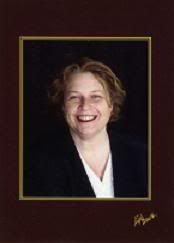Last summer, for the first time since I was 7, I attended a Latin Mass. Fr. Sean was visiting, and I knew he was going to say this form of the Mass and I didn't want to miss out. And in the last month, since St. Anne's parish has been given to the EF form, and I've been "doing extra" for Lent, and some of the daily Mass times are convenient for me to attend and still get to work, I've been going occasionally.
I've been disappointed in the silent Canon...we're supposed to "pray along" but "they" [rubrics Nazis] seem insistent on not caring if the lay people know _Exactly where_ the priest is. If you bag the correct seat or two, where you can see the priest's hand movements, etc., you can be "in the ballpark" but not necessarily right on.
The ONE part of the canon that WAS said out loud were these three weensie words. I mean, if you're going to say SOMETHING out loud during the canon, you'd think it would be something major like "Hoc est enim Corpus meum." [This is my Body.] Nah. But WHY, I wondered, get the congregants to stir by saying aloud "Nobis quoque peccatoribus...?" [...to us, sinners also ...]
I figured it was something arcane. And it was. But I didn't know quite how arcane. I looked it up in my copy of Jungmann's "Mass of the Roman Rite." Here's what it says:
"In the Roman Ordines of the seventh century the plan supposed that the subdeacons, who, at the start of the preface, had ranged themselves in a row opposite the celebrant of the other side of the free-standing altar, and who during the canon bowed profoundly, would straighten up at the Nobis quoque and go to their assigned places so they might be ready to assist in the fraction of the bread as soon as the canon was over. This rule, which naturally had no meaning except at the grand pontifical services, was retained even when, at the end of the eight century, it became customary to recite the canon in a low tone. So, to give the subdeacons the signal when the time came, the celebrant had to say these words tin an audible voice. [etc.]"
Then the practise of having the subdeacons help in this way fell by the wayside over the centuries.
Great. So now these few words are said out loud to allow the now non-existant subdeacons a chance to help do stuff they aren't going to do because they stopped doing in centuries ago...Brilliant. But ask a little favor like "speak up so we can follow along in the missal" can't be accomodated. Sheesh.
[On another note I notice a friend of Fr. Sean's have a hissy fit over on "Z"s blog [even Z wasn't too upset about it] over a female substituting "Domine, non sum digna" [the female form] over "Domine, non sum dignus." I think I'll start saying the "digna" bit too just to tick off Fr. Sean's friend, should he be dancing in attendence.]
Monday, March 9, 2009
Subscribe to:
Post Comments (Atom)



6 comments:
Interestingly, the old missal gives three different volumes for prayers:
1) Out loud, completely audible.
2) quietly, but still audible
3) completely silently. Like a whisper.
I've heard that the canon is actually supposed to be said using the second kind of volume, but most priests use the third for some unknown reason.
What do you know, Rubric Nazis might be wrong!
I am a convert and have never been to a mass in Latin. I want to go to one badly, but am very frightened of getting hopelessly lost.
Don't worry Deb, there are many tools such as Google Maps that will help yu find the way, and most people are very helpful if you ask for directions in the neighbourhood.
(Sorry, couldn't resist!)
Beacon: ROTFL
Deb: in your case, because you haven't experienced it before - make sure to read the Mass several times over beforehand. Have you had any latin study? Makes it a lot easier.
In the EWTN daily Mass they use bits of latin for some of the common prayers. Watch that and get comfortable with that first.
Bag yourself a decent seat. Front row, far right - that way you can see the priest's motions a lot better, when he makes the crosses, how he holds his hands. Very specific, and it helps guide at least "in the ballpark" of where you are.
I dare say there are some resources on line, or it wouldn't surprise me. Check a used bookstore to see if by chance there is a Latin Missal. The new ones are awfully expensive, but I bet you can pick up either a daily or Sunday missal. get it with latin on one side and English on the other. I gather there are some "English only" ones out there, which personally, I think would be *useless* in this situation.
Joe: I swear, I think it depended on the parish. From age 4-7 (we went to the Eastern Rite Masses before that) I swear you COULD hear the priest say the canon at least with some audibility if you sat up front. The churches I went to used the dialogue Mass, then in vogue. I confirmed this with a friend 13 years older than me, because I wasn't sure if my memory was faulty. I remember it because I used to particularly liked the sound of all those saints that were in the Canon.
"Couldn't the audible 'Nobis quoque' be a reminder to all that they are sinners?"
Nope :-D
There was a time it was said out loud. then right about the 8th century WOULD be where people [common people anyway] would be having trouble with it, the nascient Romance languages being developed, plus whatever else was around. Then the Canon was audible, but in the lower tone, and that's why the voice had to be raised at all. You can't "raise" what is silent.
There are lots of things like this in the Latin Mass. Why raise a fiddleback chasuble? Carry over from the time they were the larger style now in use most places so that the arms wouldn't be impeded raising the sacred species.
"The consecration is in silence to evoke the fact that the Lord descended to earth (in the Inarnation and the Nativity) in silence."
Allegorical thoughts added long after the event!
It's a safe bet the first canon wasn't said that way! Otherwise, Jesus would have looked liked any other Jew at a Passover. Who'd have known?
It started to be said in silence when the common people could no longer readily understand Latin, and the clergy grabbed more and more of the parts the people said. [Not that they ever said the canon, but there was a lot more give and take.]
It's great that you put something together for the changeable parts of the Mass though. It can be tricky flipping through, particularly on a daily Mass.
This particular parish seems to like keeping people in the dark for the weekdays.
For instance, this morning. 40 Martyrs. Did he do it? NO. But I already had the feria Mass for this particular day marked out too. So I listen very carefully to the first words of the introit, that way I KNOW. Like it's going to kill him to come out two minutes before Mass and say which option he is taking.
Thanks a lot, Fr. Skippy!I think you guys just insist on doing this in silence so we won't know if you goof up. :-D
Haha---that Fr. Skippy belonged to the previous para!
Post a Comment